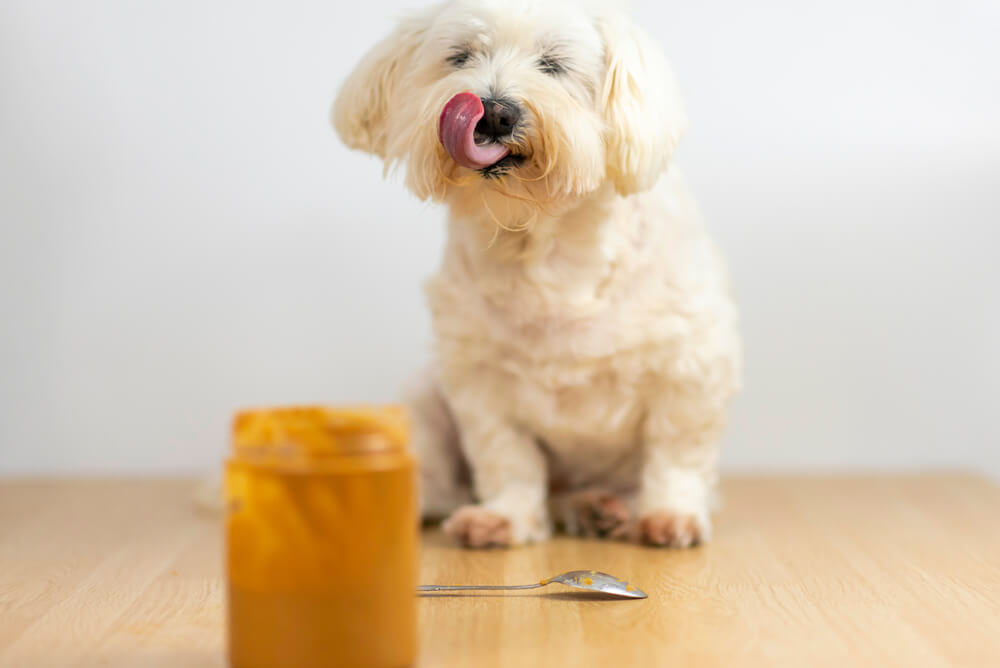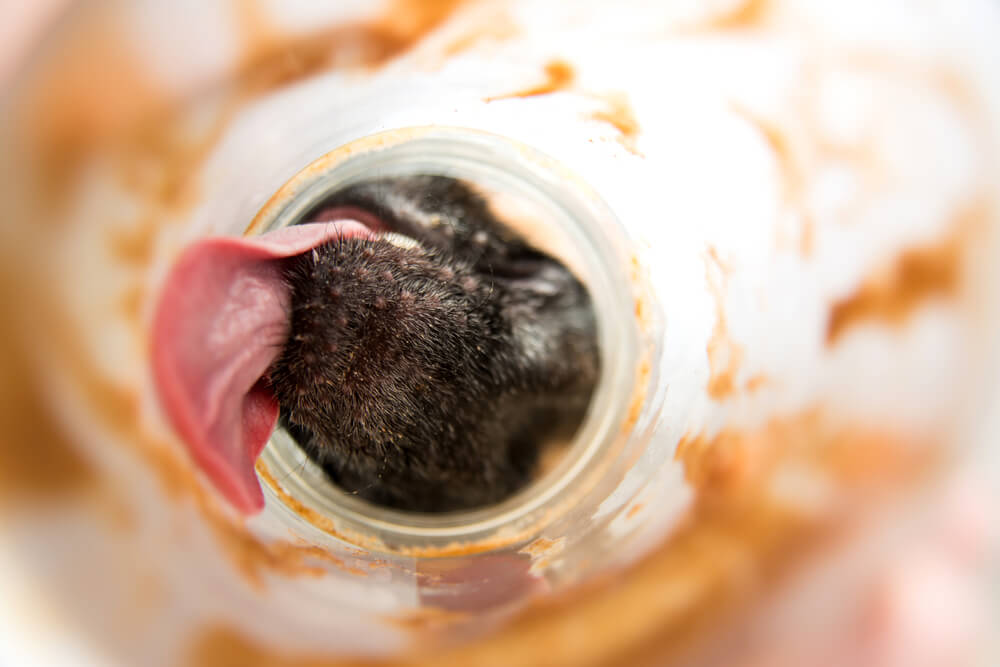Home & Family
Is Peanut Butter Good for Dogs? A Guide for Pet Owners

Peanut butter has become a beloved treat among dog owners, and its popularity continues to soar. But what is it about this creamy spread that makes it so appealing to our canine companions? Understanding the relationship between dogs and peanut butter requires a closer look at both the nutritional benefits and the sensory experiences it provides.
Firstly, peanut butter is packed with protein, healthy fats, and essential vitamins such as vitamin E and B vitamins. These nutrients can contribute positively to a dog’s diet when given in moderation. The texture of peanut butter also plays a significant role in its appeal. Its sticky consistency can keep dogs engaged for longer periods as they work to lick every last bit from their favorite toy or spoon.
Moreover, the flavor profile of peanut butter is particularly enticing to dogs. Its rich taste satisfies their cravings for something savory yet slightly sweet, making it an irresistible treat that many dogs adore. This love affair between dogs and peanut butter often results in its use as an effective tool for training or administering medication.
In addition to these factors, there’s a practical side for dog owners too: peanut butter is readily available, easy to store, and simple to serve. It’s no wonder why so many dog owners turn to this versatile treat as part of their pet care routine. However, it’s important for pet owners to choose unsalted varieties without added sugar or artificial sweeteners like xylitol, which can be harmful to dogs.
Overall, the combination of nutritional value, engaging texture, delightful taste, and convenience helps explain why peanut butter remains a popular choice among dog lovers everywhere.
Nutritional Benefits of Peanut Butter for Dogs

Peanut butter is not just a tasty treat for dogs; it also offers several nutritional benefits that can contribute to their overall health. One of the primary advantages of peanut butter nutrition is its rich content of healthy fats for dogs. These fats are essential for maintaining a shiny coat and healthy skin, as well as supporting brain function and energy levels.
In addition to healthy fats, peanut butter is an excellent source of protein, which is crucial for building and maintaining strong muscles in dogs. Protein in peanut butter helps repair tissues and supports growth, making it particularly beneficial for active or growing pups.
Moreover, peanut butter contains various vitamins that can enhance your dog’s diet. Vitamins such as B3 (niacin) support metabolic functions, while vitamin E acts as an antioxidant that aids in protecting cells from damage. These vitamins in peanut butter contribute to a well-rounded diet when given in moderation.
While offering these benefits, it’s important to choose natural or unsalted varieties without added sugars or artificial sweeteners like xylitol, which can be harmful to dogs. By selecting the right type of peanut butter and serving it responsibly, you can provide your furry friend with a delicious snack that also supports their nutritional needs.
Potential Risks and Safety Concerns When Feeding Peanut Butter to Dogs
Feeding peanut butter to dogs can be a delightful treat, but it is important to be aware of potential risks and safety concerns. One major issue is the presence of xylitol in some peanut butter brands. Xylitol is a sugar substitute that is safe for humans but highly toxic to dogs, causing rapid insulin release and potentially leading to life-threatening hypoglycemia. Always check the label for xylitol before offering peanut butter to your furry friend.
Another concern is the possibility of dog allergies to peanuts. While not extremely common, some dogs can have allergic reactions ranging from mild itching and redness to severe symptoms like swelling or difficulty breathing. If you suspect your dog has a peanut allergy, it’s crucial to consult with your veterinarian before introducing any new treats.
To ensure safety, always opt for products with safe ingredients in dog treats. Look for natural peanut butter without added sugars or artificial additives, which can upset your dog’s stomach or lead to other health issues over time. By staying informed about these potential risks and choosing high-quality products, you can safely incorporate peanut butter into your dog’s diet as an occasional indulgence.
The Best Types of Peanut Butter to Feed Your Dog
When it comes to treating your furry friend, choosing the right type of peanut butter is essential for their health and happiness. Organic peanut butter for dogs is often considered a top choice due to its minimal processing and absence of harmful additives. Unlike processed varieties, organic options are free from artificial preservatives and chemicals, making them a safer alternative for your pet.
Understanding the difference between natural vs processed peanut butter can help you make informed decisions. Natural peanut butter typically contains just peanuts and possibly a small amount of salt, ensuring that your dog receives only the nutrients they need without any unnecessary fillers or sugars. On the other hand, processed peanut butters may include added sugars and hydrogenated oils which can be detrimental to your dog’s health.
One significant benefit of sugar-free peanut butter is its ability to prevent weight gain and related health issues in dogs. Excessive sugar consumption can lead to obesity, diabetes, and other serious conditions in pets. By opting for sugar-free varieties, you ensure that your dog enjoys their treat without compromising their well-being.
When selecting peanut butter for your dog, prioritize organic or natural options that are free from added sugars. This not only supports their overall health but also allows them to enjoy a delicious treat without any adverse effects.
How Much Peanut Butter is Safe for Dogs?
When it comes to treating your furry friend, peanut butter can be a delightful option. However, understanding the appropriate peanut butter serving size for dogs is crucial to ensure their well-being. Moderation in dog diets is key, as even healthy treats can pose risks if overconsumed.
Peanut butter is generally safe for dogs when given in moderation and free of harmful additives like xylitol. As a rule of thumb, smaller dogs should be limited to about half a teaspoon per serving, while larger breeds can enjoy up to a tablespoon. This serving size ensures that your dog enjoys the treat without exceeding their daily caloric intake.
Feeding guidelines suggest that treats should only make up about 10% of your dog’s daily caloric needs. Always consider your dog’s overall diet and health status before introducing new foods. If you’re ever unsure about how much peanut butter or any other treat is suitable for your pet, consulting with a veterinarian will provide personalized advice tailored to your dog’s specific needs.
Creative Ways to Incorporate Peanut Butter into Your Dog’s Diet
Peanut butter is a beloved treat for many dogs, and there are numerous creative ways to incorporate it into your pet’s diet. Not only does it serve as a tasty reward, but it’s also packed with protein and healthy fats. Here are some inventive ideas to make the most of this canine favorite.
One popular method is making DIY dog treats with peanut butter. You can easily whip up homemade biscuits by mixing peanut butter with oats, whole wheat flour, and eggs. Bake them until golden brown for crunchy treats that your dog will adore.
Kong stuffing ideas are another fantastic way to use peanut butter creatively. Fill a Kong toy with layers of kibble, banana slices, and a dollop of peanut butter for an engaging snack that will keep your dog entertained and satisfied. For an extra challenge on hot days, freeze the stuffed Kong before giving it to your pet.
Training treats with peanut butter can be highly effective due to their irresistible flavor. Combine equal parts of peanut butter and pumpkin puree, then roll the mixture into small balls or use silicone molds for fun shapes. These bite-sized rewards are perfect for reinforcing good behavior during training sessions.
By incorporating these creative approaches into your dog’s diet, you provide not only delicious snacks but also mental stimulation and enrichment in their daily routine. Always ensure that the peanut butter used is free from xylitol or other harmful additives to keep your furry friend safe and healthy.
Conclusion – Making Informed Decisions About Using Peanut Butter as a Dog Treat
When deciding whether to incorporate peanut butter into your dog’s treat regimen, it’s important to weigh the benefits and potential risks. Peanut butter can be a delightful and protein-rich option for dogs, providing them with essential nutrients like healthy fats, vitamins B and E, and niacin. However, not all peanut butters are created equal. It’s crucial to choose a product that is free from harmful additives such as xylitol, which is toxic to dogs.
Before introducing peanut butter into your pet’s diet, consider their individual health needs. Dogs with allergies or specific dietary restrictions may not tolerate peanut butter well. Consulting with your veterinarian can provide personalized guidance based on your dog’s health profile.
Moderation is key when offering peanut butter as a treat. While it can be an excellent tool for training or administering medication due to its enticing taste, excessive consumption could lead to weight gain or digestive issues.
Making informed decisions about using peanut butter as a dog treat involves balancing its nutritional benefits with any potential health concerns. By selecting safe products and consulting professionals when in doubt, you can ensure that this popular snack becomes a healthy part of your dog’s diet.
